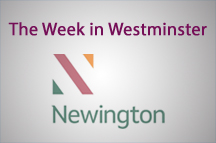.gif) Kicking off the week in Westminster was a speech from the Prime Minister designed to reassure business worried about the forthcoming Brexit negotiations. In it Theresa May outlined that the ability for the UK to make final decisions on immigration policy and no longer remain under the jurisdiction of the European Court of Justice were her two red lines. The response to the speech from European spokespeople who reiterated that the four freedoms of the European Union were indivisible, meant that it looks more and more likely that the UK is moving towards a hard Brexit and that the City’s concerns, chiefly around passporting and access to markets, outlined effectively by TheCityUK later in the week, may well be realised.
Kicking off the week in Westminster was a speech from the Prime Minister designed to reassure business worried about the forthcoming Brexit negotiations. In it Theresa May outlined that the ability for the UK to make final decisions on immigration policy and no longer remain under the jurisdiction of the European Court of Justice were her two red lines. The response to the speech from European spokespeople who reiterated that the four freedoms of the European Union were indivisible, meant that it looks more and more likely that the UK is moving towards a hard Brexit and that the City’s concerns, chiefly around passporting and access to markets, outlined effectively by TheCityUK later in the week, may well be realised.
Tuesday saw a relaunch of a more populist Corbyn 2.0. This relaunch, which had the intention of showing the Leader of the Opposition as being more in line with ordinary people and those that supported Brexit, was somewhat undermined by a failure on the part of Jeremy Corbyn to hold his line on limits to migration and raising in his speech the prospect of ‘caps on pay’, without having the policy answers to support his position.
 Wednesday started better for Labour as the focus was on the National Health Service and the looming crisis in hospitals caused by the onset of a particularly hard winter and the release of figures showing many NHS Trusts had missed their targets. PMQs saw Theresa May under pressure from Corbyn who devoted all six of his questions to the NHS and what is clearly comfortable ground for Labour. However, Labour’s team did seem to demonstrate a lack of political insight by later in the day press releasing Corbyn’s position on UK troop deployments increasing tension with Russia that made Labour’s Defence Secretary, Nia Griffith, livid and gave the papers an opportunity to report something other than the NHS.
Wednesday started better for Labour as the focus was on the National Health Service and the looming crisis in hospitals caused by the onset of a particularly hard winter and the release of figures showing many NHS Trusts had missed their targets. PMQs saw Theresa May under pressure from Corbyn who devoted all six of his questions to the NHS and what is clearly comfortable ground for Labour. However, Labour’s team did seem to demonstrate a lack of political insight by later in the day press releasing Corbyn’s position on UK troop deployments increasing tension with Russia that made Labour’s Defence Secretary, Nia Griffith, livid and gave the papers an opportunity to report something other than the NHS.
Yet the NHS discussion didn’t go away and Simon Stevens, the Head of the NHS, challenged the PM in his appearance before a select committee by seeming to contradict the Government’s position that the NHS was being given all the money it needs. Saying that the Government’s statements were not accurate and that the NHS indeed was facing severe pressures. With the onset of extreme cold conditions over the next few weeks across much of the UK, this issue is likely to rumble on across the winter months and if Labour can keep the focus on the NHS, then in normal times you would expect them to see some improvement in their polling position.
The domestic week though was somewhat overshadowed by the forthcoming inauguration of Donald Trump as the next President of the United States and nominally leader of the free world. Questions over his relationship with Russia dominated for both him and his intended Secretary of State, Rex Tillerson, who faced a Senate confirmation meeting. One thing is certain, Donald Trump captures the attention of the world at his press conferences, rare though they are.














